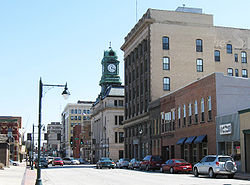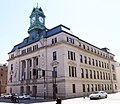Fort Dodge, Iowa
Fort Dodge, Iowa | |
|---|---|
 Central Avenue | |
| Motto: The city with bright days ahead. | |
 Location in the State of Iowa | |
| Country | |
| State | |
| County | Webster |
| Incorporated | 1869 |
| Government | |
| • Mayor | Terry Lutz |
| Area | |
• Total | 38.4 km2 (14.8 sq mi) |
| • Land | 37.7 km2 (14.6 sq mi) |
| • Water | 0.7 km2 (0.3 sq mi) |
| Elevation | 352 m (1,155 ft) |
| Population (2000) | |
• Total | 25,136 |
| • Density | 666.6/km2 (1,726.1/sq mi) |
| Time zone | UTC-6 (CST) |
| • Summer (DST) | UTC-5 (CDT) |
| ZIP code | 50501 |
| Area code | 515 |
| FIPS code | 19-28515 |
| GNIS feature ID | 0456686 |
| Website | http://www.fortdodgeiowa.org/ |
Fort Dodge is a city and county seat of Webster County, Iowa, United States, situated on the Des Moines River. The population was 25,136 at the 2000 census. Fort Dodge is a major commercial center for North Central and Northwest Iowa. It is located on U.S. Routes 20 and 169.
Geography
Fort Dodge is located at 42°30′24″N 94°10′49″W / 42.50667°N 94.18028°W (42.506803, -94.180271)Template:GR.
According to the United States Census Bureau, the city has a total area of 14.8 square miles (38.4 km²), of which, 14.6 square miles (37.7 km²) of it is land and 0.3 square miles (0.7 km²) of it (1.89%) is water.
Demographics
As of the censusTemplate:GR of 2000, there were 25,136 people, 10,470 households, and 6,376 families residing in the city. The population density was 1,726.1 people per square mile (666.6/km²). There were 11,168 housing units at an average density of 766.9/sq mi (296.2/km²). The racial makeup of the city was 92.47% White, 3.79% African American, 0.21% Native American, 0.85% Asian, 0.02% Pacific Islander, 1.30% from other races, and 1.36% from two or more races. Hispanic or Latino of any race were 2.94% of the population.
There were 10,470 households out of which 29.0% had children under the age of 18 living with them, 45.9% were married couples living together, 11.4% had a female householder with no husband present, and 39.1% were non-families. 33.8% of all households were made up of individuals and 14.1% had someone living alone who was 65 years of age or older. The average household size was 2.29 and the average family size was 2.94.
Population spread: 24.3% under the age of 18, 10.7% from 18 to 24, 25.2% from 25 to 44, 21.2% from 45 to 64, and 18.5% who were 65 years of age or older. The median age was 38 years. For every 100 females there were 90.5 males. For every 100 females age 18 and over, there were 86.7 males.
| Census | Pop. | Note | %± |
|---|---|---|---|
| 1860 | 672 | — | |
| 1870 | 3,095 | 360.6% | |
| 1880 | 3,586 | 15.9% | |
| 1890 | 4,871 | 35.8% | |
| 1900 | 12,162 | 149.7% | |
| 1910 | 15,543 | 27.8% | |
| 1920 | 19,347 | 24.5% | |
| 1930 | 21,895 | 13.2% | |
| 1940 | 22,904 | 4.6% | |
| 1950 | 25,115 | 9.7% | |
| 1960 | 28,399 | 13.1% | |
| 1970 | 31,263 | 10.1% | |
| 1980 | 29,423 | −5.9% | |
| 1990 | 25,894 | −12.0% | |
| 2000 | 25,136 | −2.9% |
The median income for a household in the city was $33,361, and the median income for a family was $42,555. Males had a median income of $31,253 versus $23,360 for females. The per capita income for the city was $18,018. About 7.7% of families and 11.6% of the population were below the poverty line, including 14.2% of those under age 18 and 7.2% of those age 65 or over.
History
Fort Dodge traces its beginnings to 1850 when soldiers from the United States Army erected a fort at the junction of the Des Moines River and Lizard Creek. The fort was abandoned in 1853 and the next year William Willams, a civilian storekeeper in Fort Dodge, purchased the land and buildings of the old fort. The town of Fort Dodge was founded in 1869.
In 1872 the long and continuing history of gypsum production in Iowa started when George Ringland, Webb Vincent, and Stillman T. Meservey formed the Fort Dodge Plaster Mills to mine, grind, and preparing gypsum for commercial use. The Company constructed the first gypsum mill west of the Mississippi, at the head of what is now Gypsum Creek.
Transportation
U.S. Highway 20 bypasses Fort Dodge to the south, and U.S. 169 skirts the west side of the city; both highways have business routes through town. Iowa Highway 7 has its terminus at the northwest edge of the city.
The Fort Dodge Regional Airport is located north of town. It is primarily a general aviation airport with minimal commercial links.
Jefferson Bus lines serves Fort Dodge with a link to Williams.
Major industries
The major industries of Fort Dodge are gypsum and limestone mining, drywall manufacturing, trucking, the manufacture of veterinary pharmaceuticals and vaccines, and retail.
Gypsum rock is processed into drywall and plaster products at several Fort Dodge manufacturing facilities. Drywall was patented by a Fort Dodge resident, and the gypsum used to create the Cardiff Giant hoax of the late 19th century was mined at Fort Dodge. Currently National Gypsum Company, Georgia Pacific Corporation, Celotex Corporation, and the United States Gypsum Company operate gypsum facilities in and around Fort dodge.
Fort Dodge is the home of Fort Dodge Animal Health (a division of Boehringer Ingelheim)[1], a major producer of pharmaceuticals and vaccines for vetinarian use, the company's headquarters were moved from Fort Dodge to Overland Park, Kansas in 1995. Two of the company's three USA manufacturing plants are located in Fort Dodge.
At least three major national trucking companies (primarily flatbed carriers serving the drywall industry) are based out of Fort Dodge.
Fort Dodge serves as a retail center for North-Central Iowa.
The Fort Dodge Correctional Facility, 1,250-bed medium security state prison, opened in 1998.
For most of the 20th century, meatpacking was a major industry in Fort Dodge. The last two large meatpacking plants (owned by IBP and Hormel) closed during the 1980s. One of the laboratories of Fort Dodge Animal Health was built on the site of a former Hormel processing plant.
Cultural
The Fort Museum and Frontier Village is located on the southeast edge of Fort Dodge. It is a full scale recreation of a military outpost on the prairie from the 19th century. It also features a recreated village from the same time period. Additionally, The Fort Museum has a replica of the Cardiff Giant, which was a fossilized giant humanoid "discovered" at Cardiff, New York. The Cardiff Giant was later proved to be a hoax, sculpted from gypsum mined at Fort Dodge. A "Frontier Days" event is held every year. It features a parade down Central Avenue, a buckskinner camp, and live entertainment. 2009 marks the 35th year of the event, with festivities taking place on June 5 and 6.
The Blanden Memorial Art Museum, the first public museum of art in the state of Iowa, is located in the historic Oak Hill district of Fort Dodge. The Blanden, opened June 5, 1932, is renowned as one of the finest small museums in the nation for its extensive permanent collection as well as popular touring exhibits.
The Fort Dodge municipal band is the Karl King Band, named after well-known composer Karl L. King, who was the leader of the municipal band for fifty years before his death in 1971. Several local landmarks are named after Karl King, including the bandshell at Oleson Park, a memorial statue in front of the Fort Dodge Public Library, and a bridge over the Des Moines River.
Hawkeye Community Theatre, one of the longest continually running theatre organizations in the state, is located on 521 North 12th Street. It is housed in a century old classic building converted for live theatre performances, and seats 220. HCT puts on six full length productions a year of varied genre.
Fort Dodge gallery
EducationFort Dodge is the home to the central campus of Iowa Central Community College. Fort Dodge is served by the Fort Dodge Community School District. The public school system includes Fort Dodge Senior High School (9-12), Phillips Middle School (Fort Dodge, Iowa) (PMS) (7-8), Fair Oaks (5-6), and several elementary schools. Private schools in Fort Dodge include St. Edmond (Preschool-12), Community Christian School (pre-K -8), St Paul Lutheran (Preschool-8), and Harvest Baptist School (7-12) Fort Dodge has been the location of Iowa High School Athletic Association championship events. Currently, the cross country championships are held at John F. Kennedy Park north of the town. Fort Dodge also hosts the Iowa girls' softball championship tournament at Harlan Rogers Park. RecreationOleson Park boasts a small zoo featuring a small population of albino white tailed deer and other animals. Oleson Park also has woods and hiking trails. The town's recently restored band shell is located here. Snell-Crawford Park (located at Williams Drive and 12th Avenue North) is a local favorite for weekend recreation. It has a disc golf course, three sand volleyball courts, a jogging/walking/bicycling trail, picnic tables, and grills. Soldier Creek runs through the park. John F. Kennedy Park is the nearest camping facility to Fort Dodge. It has a large campground, a lake with a swimming beach, a playground, and hiking trails. Lakeside Municipal Golf Course, an 18-hole course, is located here. The 300 acres (1.2 km2) Gypsum City Off-Highway Vehicle Park opened to the public on July 6, 2006. The park is located on abandoned gypsum mines. Plans are in place for the park to be expanded to as much as 1,500 acres (6.1 km2) in the future. Fort Dodge is a top tubing destination in the state, offering the swift and clear waters of Lizard Creek, solitude on the Des Moines River from Fort Dodge to the Dolliver Memorial State Park, and the nearby lake at Brushy Creek. The Fort Dodge Country Club par 71 golf course is one of Iowa's top courses. Woodman Hollow State Preserve lies roughly 7 miles southeast of Fort Dodge. Notable natives
MediaAM radio stations
FM radio stations
Television stations
TheatreWeb 2.0
ReferencesExternal links |









